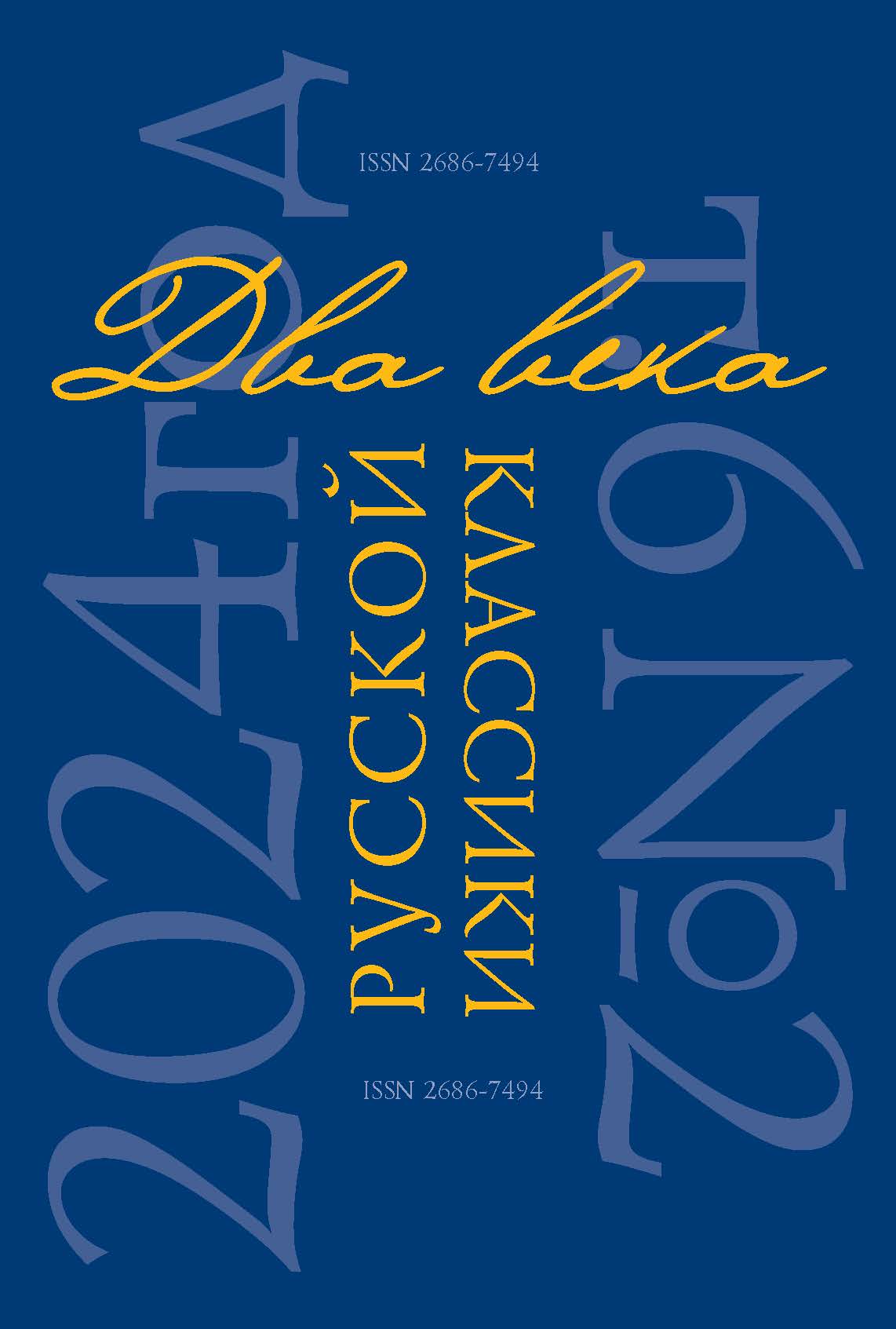Abstract:
The article is devoted to the journey of the writer-ethnographer S. V. Maksimov in the Vladimir province, which took place in the summer of 1855 during his first large expedition — in the Vladimir, Nizhny Novgorod and Vyatka provinces. Despite the fact that Maximov’s impressions were not immediately reflected and formed into a framed text, they had a significant impact on the writer’s work. Comparison of the first published archival manuscript of Maximov, dedicated to the crafts of Sudogodsky district, and the books “In the East” (1864), “Siberia and penal servitude” (section “Prison Dictionary”) (1871), “Wandering Russia for Christ’s Sake” (1877), “Winged Words. It is not for nothing and not for nothing that the word is said and will not break until the century” (1899), as well as the involvement of sources used by Maximov, demonstrates the features of the writer’s creative laboratory, the transformation of factual material into an artistic text. The study of the results of Maksimov’s journey allows to speak about the significant role of the trip both for Maksimov’s creativity (in terms of the accumulation of aterial to which he will repeatedly refer, the formation of the principles of writing and ethnographic work, etc.) and for the local history of the Vladimir Region.
References
Blagoveshchenskii, V. S. “Statisticheskoe obozrenie sostoianiia Vladimirskoi gubernii v 1817 godu” [“Statistical Review of the State of the Vladimir Province in 1817”]. Tikhonravov, K., editor. Vladimirskii istoriko-statisticheskii sbornik [Vladimir Historical and Statistical Collection]. Vladimir, Izdanie Vladimirskogo gubernskogo statisticheskogo komiteta Publ., 1869, pp. 1–50. (In Russ.)
Bondaletov, V. D. V. I. Dal’ i tainye iazyki v Rossii [V. I. Dal and Secret Languages in Russia]. Moscow, Flinta Publ., 2017. 455 p. (In Russ.)
Dubrovskii, P. S. Narodnye promysly kak forma melkotovarnogo proizvodstva (ekonomiko-teoreticheskii ocherk s istoricheskimi vstavkami) [Folk Crafts as a Form of Small-scale Production (An Economic and Theoretical Essay with Historical Inserts)]. Ivanovo-Shuia, Vest’ Publ., 2005. 128 p. (In Russ.)
Dubrovskii, P. S., Dubrovskii S. P. “Ofeni-ikonshchiki vo Vladimirskoi gubernii” [“Ofen-icons in the Vladimir Province”]. Rozhdestvenskii sbornik [Christmas Collection]. Kovrov, Mashteks Publ., 2008, pp. 104–109. (In Russ.)
Pantiukhov, I. “Selenie Kholui” [“The Village of Kholui”]. Likhachev, A. E., editor. Pozharskii iubileinyi al’manakh [Pozharsky Jubilee Almanac], issue 3: K 460-letiiu pervogo pis’mennogo upominaniia sela Kholui [To the 460th Anniversary of the First Written Mention of the Village of Kholui]. Ivanovo, Talka Publ., 2007, pp. 82–100. (In Russ.)
Priemysheva, M. N. “I. I. Sreznevskii ob ofenskom iazyke (‘Ofensko-russkii’ i ‘russkoofenskii’ slovari I. I. Sreznevskogo 1839 g. iz sobraniia PFA RAN)” [“I. I. Sreznevsky about the Offen Language (‘Ofen-Russian’ and ‘Russian-Ofen’ Dictionaries of I. I. Sreznevsky 1839 from the Сollection of the PFA RAS)”]. Acta Linguistica Petropolitana. Trudy instituta lingvisticheskikh issledovanii, vol. 3, no. 3, 2007, pp. 335–360. (In Russ.)
Pypin, A. N. Istoriia russkoi etnografii [History of Russian Ethnography], vol. 2: Obshchii obzor izuchenii narodnosti i etnografiia velikorusskaia [General Overview of Studies of Nationality and Great Russian Ethnography]. St. Petersburg, Tipografiia M. M. Stasiulevicha Publ., 1891. 428 p. (In Russ.)
Russkii biograficheskii slovar’ [Russian Biographical Dictionary], vol. 25. St. Petersburg, Imperatorskoe russkoe istoricheskoe obshchestvo Publ., 1896–1913. Iablonovskii-Fomin Publ., 1913. 493 p. (In Russ.)
Fokeev, A. L. “Sergei Vasil’evich Maksimov” [“Sergey Vasilyevich Maksimov”]. Znamenie vremeni. Proza XIX veka [Sign of the Times. Prose of the 19th Century]. Saratov, Litsei Publ., 2005. 208 p. (In Russ.)
Shcherbakova, M. I. “V. I. Dal’ i S. V. Maksimov” [“V. I. Dal and S. V. Maksimov”]. Filologiia v sisteme sovremennogo universitetskogo obrazovaniia [Philology in the System of Modern University Education], issue 5. Moscow, University of the Russian Academy of Education Publ., 2002, pp. 132–137. (In Russ.)
Shcherbakova, M. I. Proza S. V. Maksimova: Tekstologiia i voprosy poetiki [Prose of S. V. Maksimov: Textual Criticism and Questions of Poetics: DSc Dissertation]. Moscow, 1997. 418 p. (In Russ.)









